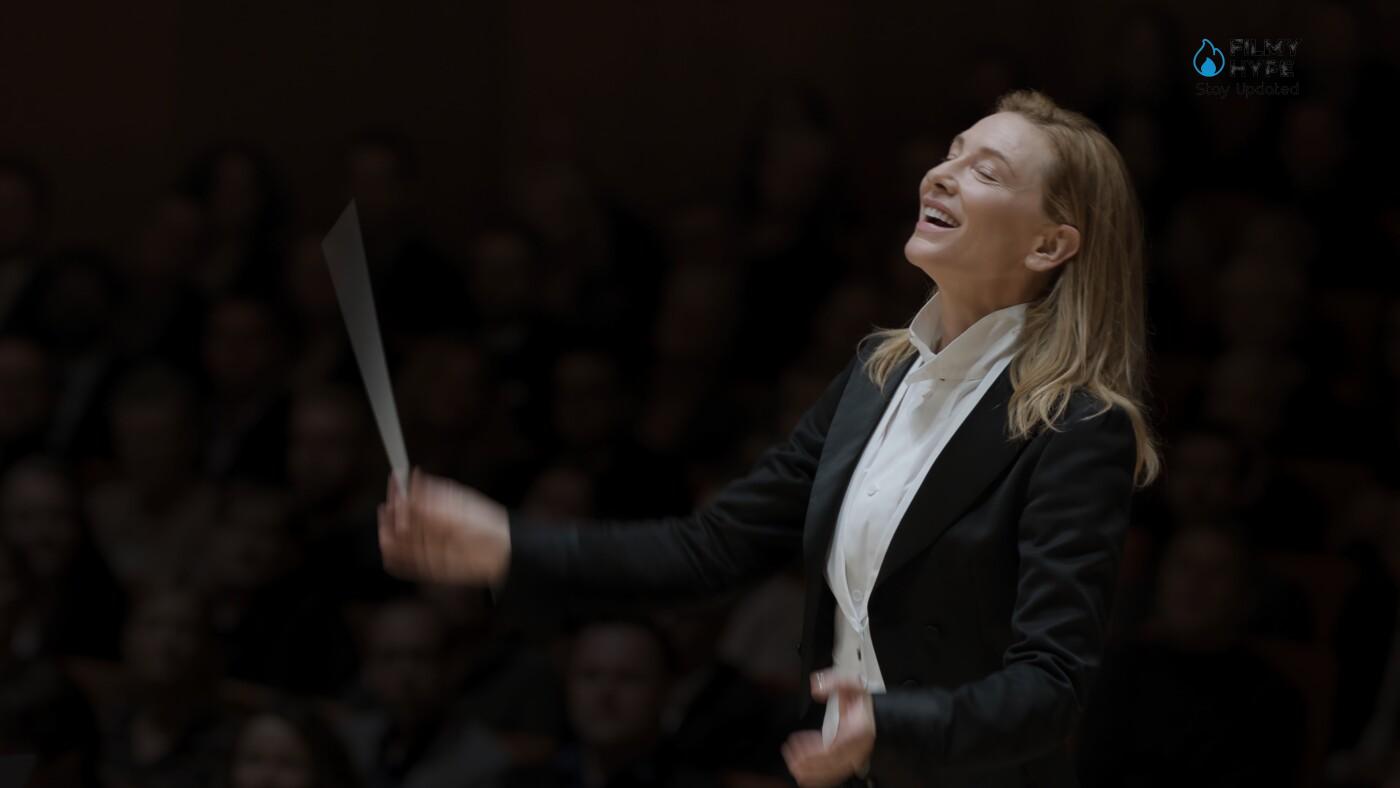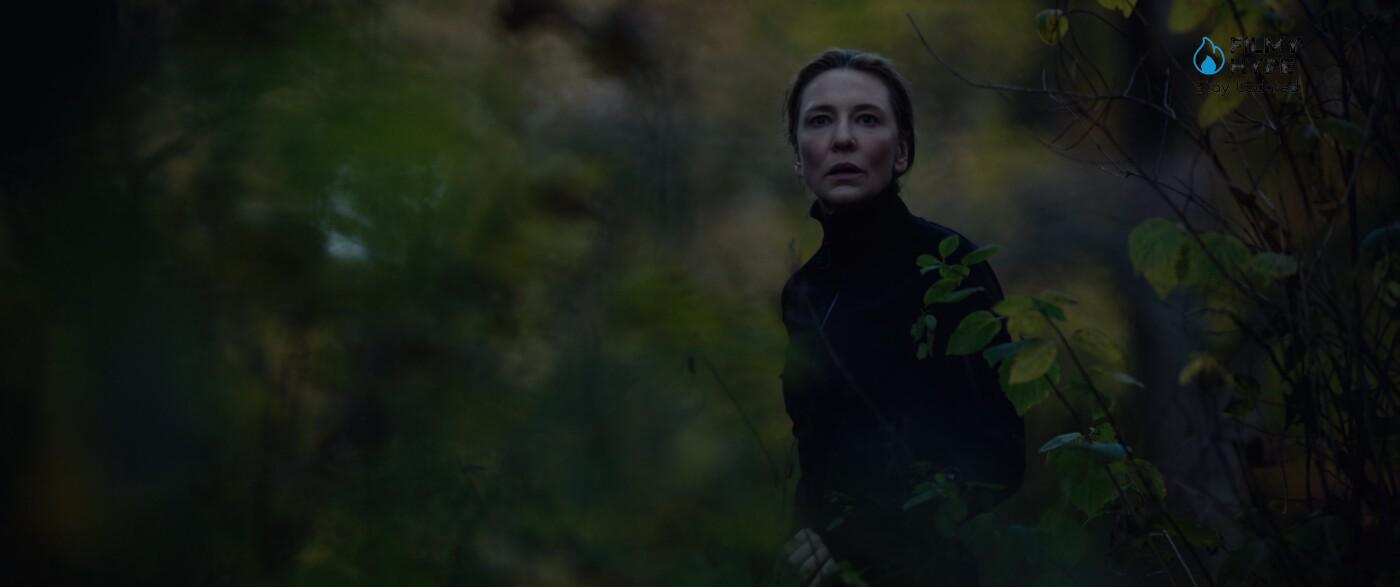Tár Review: Lydia Tár Is One of The Greatest Conductors In The World | Venice 79
Stars: Cate Blanchett, Mark Strong, Julian Glover
Director: Todd Field
Filmyhype.com Ratings: 4/5 (four stars)
Music, Maestro. The hands of Lydia Tàr are preparing to orchestrate a story suspended between the real and the imaginative since the beginning of Tár. After years of absence, Todd Field entrusts Cate Blanchett and her Tár, presented at the Venice Film Festival 2022, with the task of setting up a musical score in which facts will be confused with innuendo, seduction and outrage, and which will make it clear that not even the precision of a metronome can perfectly mark the time of uncertain existences. The cast of Tàr also includes Noémie Merlant, Nina Hoss, Sophie Kauer, Julian Glover, Allan Corduner and Mark Strong. Tár will be released in the United States on October 7, 2022, by Focus Features.

To approach Todd Field’s new film (behind the camera again after 16 years of absence) it is not necessary to know who this compositional genius is, for one simple reason: Tár is a fictional character. After half an hour of the film, however, he will struggle to believe it: his existence, his psychology and his career are told in stunning detail. He will seem to us to know her, to have surely read about her somewhere, to have heard about her relationship with the violinist Sharon and to have watched one of her hypnotic performances on YouTube.
Tár Review: The Story
Lydia Tár has done everything: renowned and esteemed conductor and composer in the international world of classical music, she presents herself as a fearless female figure, who protects the value of listening and knowledge that she struggled to earn in her youth and he finds to reproach young people for the lack of curiosity they show in probing the musical matter in depth. Integral, demanding, extremely seductive in her gestures and thanks to the work – off the stage – of the costume department, Lydia is the first conductor of a full-fledged orchestra, who does not simply figure as a guest. Lydia is also a woman friend of women. She has a trusted collaborator, Francesca (Merlant) a partner with whom he also shares a daughter (Hoss) and founded a scholarship program for young girls studying at the conservatory.
Lydia Tár must conclude and record the symphony that will take her formidable career to new heights. The search for the perfect melody, with the first chords and the first intuitions that chase Lydia in the most disparate ways during the days, is however hampered by the only persistent sound throughout the film: the knock-knock that resounds on the doors of several Berlin houses – we won’t tell you which Lydia lives – but they are many and varied. Time – which Lydia does not know how to occupy, but delegates, and lets others manage – is marked by the doors that our protagonist decides to open or keep closed: they are doors on female existences, doors that open to the ghosts of the past, to variations on the theme of femininity and with whom Lydia didn’t do the math at all.
Tár Review and Analysis
If we talk about verisimilitude and credibility, it goes without saying that behind the patina of perfection and balance lies something else: the goddess of music Lydia Tár is a person who makes mistakes, she is enigmatic, and in her youth, she was bullied. There is certainly something about her from her past that haunts her, which makes her fragile and unprepared to confront herself. It is here that the film changes register, adhering to the stylistic features of the thriller and even those of horror, also but not only through the “sound” use of disturbing elements that are alien to her: a whistling refrigerator, a vague note perhaps coming from the neighbor’s apartment, the heart-breaking scream of a woman during a run in the park.
Dark signs of a mighty collapse, as well as the definitive emergence of the problems that pierce his daily life. Between one orchestral rehearsal and the other, we discover that Tár runs a scholarship program for women administered by an annoying conductor and that this project seems to include several young students with whom Tár has undertaken extra-work relationships. The dialogue with her assistant, then, is crossed by continuous unexpressed tensions destined to explode, and to all this is added the persecution by another former pupil obsessed with her. Harmony, painstakingly constructed with years of study and dedication, will irrevocably fall apart.
The slow and hypnotic pace of Field’s film allows us to reflect on various aspects. On the concept of women’s rights and equality, for example, as the protagonist Cate Blanchett herself recalled (her colossal interpretation, perhaps from the Venetian Volpi Cup and certainly from nomination to the next Oscars) “in art, there is no equivalent to the feminine of the word Maestro, a name with which it is constantly called Tár ”. It is no coincidence that in the film the protagonist recalls how the great conductors who preceded her at the direction of the Berlin Philharmonic – Boulanger and Brico – have always been considered “guests” as if the role was exclusively reserved for men.

Other issues remain on the table of this rarefied drama, which essentially has to do with the world of work, the compromises one is willing to make and the risks one runs in contemporary society. TÁR is – as much as this description may make sense – a “complete” work, full. The first great film of the Venice 79 competition, the perfect one for the awards season and which seems impossible to us, can be excluded. Just think of the complexity of the script or Florian Hoffmeister’s “epic” photography. Just think of the profound humanity of this descent into hell, an immersive experience destined to remain etched in the viewer’s gaze and memory like the tangible obsessions of Lydia Tár.
A Cate Blanchett in a state of grace takes on a pioneering role with Tár in the “cinema of the #metoo”, in which the characteristics of the villain clash with the responsibilities and cultural importance of a heroine as disturbing as it is engaging. Lydia‘s point of view is firm, as rigorous as her professional approach, but she begins to waver when she has to clash with the other, a narrative variable that takes on multiple forms: an important performance, the consequences of an abruptly interrupted relationship, the perspectives that are written and erased on the staff in a flash.
For Lydia, fame and success are inviolable axioms, a fundamental part of her Hic et Nunc, which sanction her authorial ambitions. But Lydia does not know that today you are an icon, tomorrow you could become the laughing stock of Twitter. The classical symphonies that frame the portrait are vestiges of a past of illustrious traditions and the result of sacrifices and talents, attributable to the European music scene, totally detached from the social communication system, in which any content can be modified before being disclosed, unhinging perspectives and manipulating the truth of the facts. Lydia inhabits physical, not virtual places. You know the music movement, but not that of social users. But Lydia is Tár, an unknowable icon with an uncorrupted moral compass and as such, it must maintain its reputation. There is no time to rethink past mistakes, flee from the present or seek a solution to something that is now considered irrecoverable. The icon goes on and lives between and in the instruments, an extension of a body that hides many folds.
Tár Review: The Last Words
In the age of liquid information, the character regresses per person if something comes to light that was – consciously or not – hidden. What remains of Lydia, if Tàr is gone? What is the orchestra we want to surround ourselves with and what are the instruments that we have decided to reject? Lydia Tàr‘s answer will confuse you, but Cate Blanchett will enchant you.






